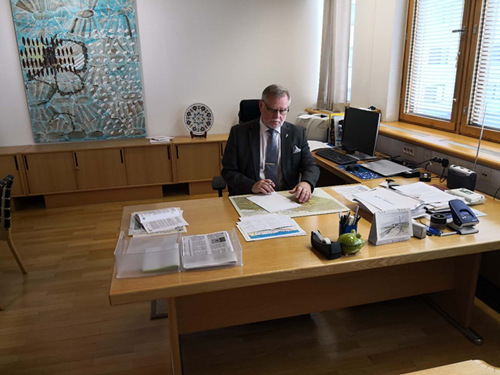By Tom McGregor, commentator and copy editor for CCTV.com Panview
Editor’s Note: At the invitation of the City of Rovaniemi, Finland, CCTV.com Panview took a tour to visit tourist sites and had exclusive interviews with local government officials and business leaders. Senior executives at Finnair also spoke to CCTV.com as well.

The tourism sector can be very profitable and could generate much more tax revenues for local communities. Yet, building tourist sites are often a hit-or-miss strategy. And when many people think about Finland, they ponder images of frigid and snowy winters, as well as stereotypes of silent Finns brooding in despair. Nevertheless, the claims of unhappy Finns and unbearable weather conditions are not the true story about the nation and its citizens.
The City of Rovaniemi is located on the southern border of the Arctic Circle and it's the largest and provincial capital of the region called, Lapland. If you take a closer inspection of a map, you will discover the land covers territory in Finland, Sweden, Norway and Russia.

Lake located north of Rovaniemi, Finland (Photo/Tom McGregor)
Rovaniemi is actually the largest city in territorial size in Europe - 8,016 sq/km, slightly over 61,000 people live there, while Lapland’s entire population, stands at around 182,000 - with more reindeer than human beings in the region.
Nonetheless, Rovaniemi has become a stunning success story in attracting tourists from all over the world, since it's the official hometown of Santa Claus.
According to tour guides at Santa Claus Village, Rovaniemi declared itself as hometown of Santa about 20 years ago and built red and white-stripes cottages to welcome visitors. Millions of tourists have flocked to Rovaniemi annually during the Christmas season.
But the Chinese had largely avoided coming to Rovaniemi until recently. Many Chinese were unfamiliar with Western Christmas traditions such as knowing about Santa. Plus, the Chinese with enough money could go to the Alps if they wish to take part in snowy cold European winters instead.
But the 'Visit Rovaniemi' tourist agency, aligned with the local government and working closely with the city's mayor - Esko Lotvonen, had drawn up plans a few years ago to attract more Chinese visitors.

Rovaniemi Mayor Esko Lotvonen signing documents to open Confucius Insitutute at Lapland University. (Photo/Tom McGregor)
"We knew that China is the world's second largest economy and we can not ignore them," said Sanna Karkkainen, managing director of Visit Rovaniemi at Rovaniemi Town Hall, told CCTV.com Panview. “When we told marketing experts about our plans they said it would take about 10 years to draw in big Chinese crowds, since that's how long it took to bring in many Japanese tourists.”
"But after launching marketing campaigns in the Chinese language, we met our goals within 2-3 years," said Karkkainen. She disclosed that Chinese tourists now account for 70% of all overseas tourists coming to the Lapland during winter.
She explained the turning point for Chinese tourism started in Nov. 2016 when Alibaba Group launched a marketing campaign and invited 100 Chinese tourists to Rovaniemi to announce the digital payment service AliPay can be used at all shops in the city.

Handicrafts for sale at the home of Ari and Irene Kangasniemi where customers can use AliPay to purchase items in Rovaniemi, Finland. (Photo/Tom McGregor)
Additionally, when Xi Jinping was China's Vice President in 2010, he visited Santa Claus at his hometown. During President Xi's state visit to Finland in April 2017, Santa's Village was granted permission to place a photograph of Xi sitting with Santa on their "Wall of Honor," which has become the most popular picture on display.
Accordingly, Rovaniemi, as a special tourism site, had gone viral on Chinese Social Media sites and hence Finnish companies have discovered the advantages of utilizing Social Media to lure in more Chinese visitors and customers to generate bigger sales revenues.
"A crucial reason why Finnair, the flagship airlines for Finland, has enjoyed so much success in getting so many Chinese to fly with us is that we have a very aggressive digital (Social Media) marketing campaign," Mikko Turtiainen, vice president of Global Sales for Finnair, told CCTV.com Panview.
Turtiainen is a man who does not appear as the stereotypical silent and taciturn Finn. He speaks with passion and high energy, showing eagerness to talk to anyone he meets. He has played a leading role in the airlines’ Social Media campaign. At the moment, Finnair is about to appoint a new CEO (chief executive officer) and he is considered one of the leading contenders for the job.
"We are the first airlines from Europe to launch flight routes to and from China, which was about 30 years ago. You can go on Alibaba's TMALL to buy Finnair tickets and also on JD.com. You can use AliPay or WeChat Pay to buy them," added Turtiainen.
Accordingly, the Finnish tourism industry has captured the hearts of many Chinese tourists by taking a proactive approach to China's Social Media, especially on WeChat.
When talking to Rovaniemi residents, they hold deep respect for the Chinese. As more Chinese arrive in Finland, they are developing closer friendships, so we can see how the Chinese and Finns can forge an enduring bond for peace and prosperity.

Ari Kangasniemi, Lappish arts and craftsman in Rovaniemi, Finland, talks about the many times he met Chinese visitors. (Photo/Tom McGregor)
Meanwhile, Rovaniemi Mayor Esko Lotvonen signed a document in front of CCTV.com to announce plans for a Chinese-language learning program, the Confucius Institute, to open up at Lapland University in the near future.
(The opinions expressed here do not necessarily reflect the opinions of Panview or CCTV.com. )

Panview offers a new window of understanding the world as well as China through the views, opinions, and analysis of experts. We also welcome outside submissions, so feel free to send in your own editorials to "globalopinion@vip.cntv.cn" for consideration.
















